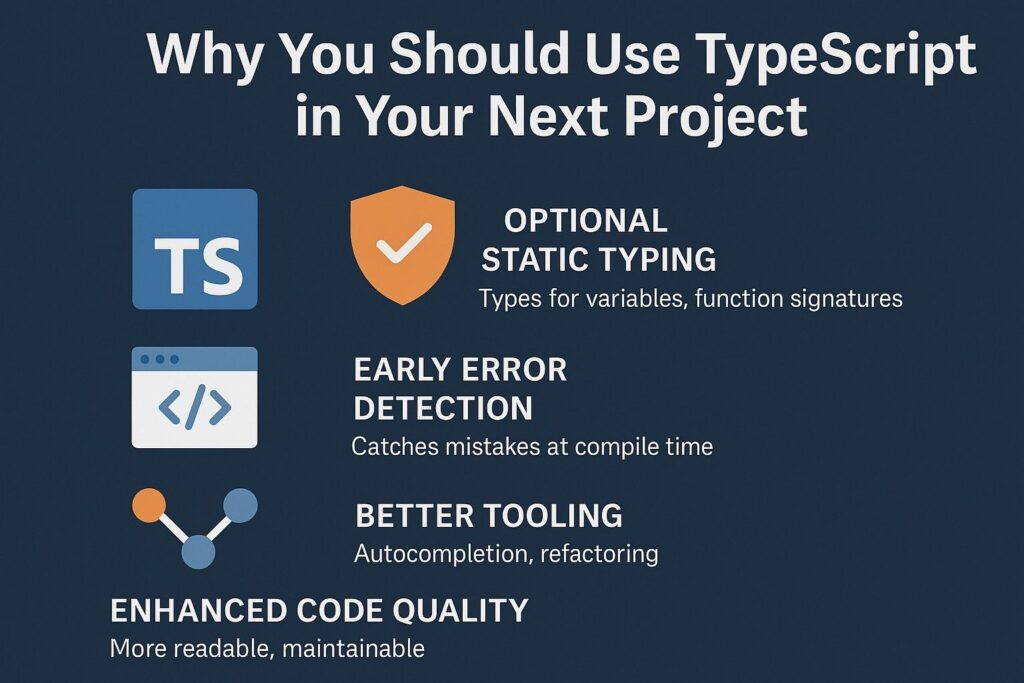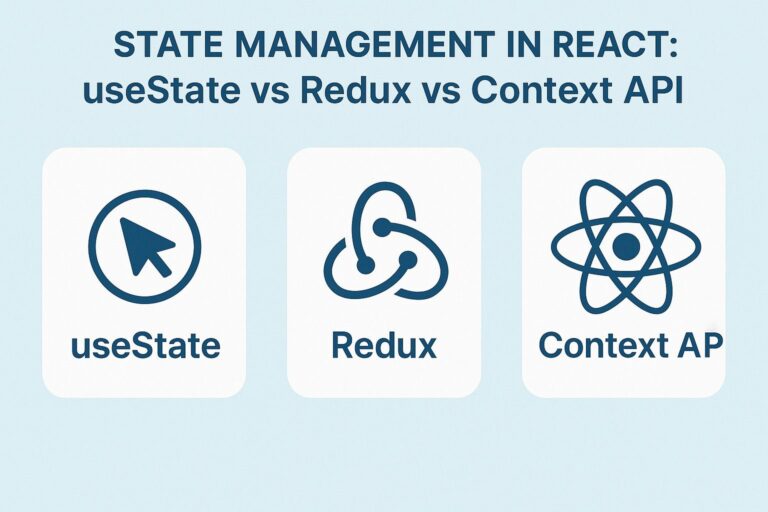
TypeScript has emerged as one of the most popular tools for modern web development. Built on top of JavaScript, it adds optional static typing and powerful tooling features that help developers write cleaner, more maintainable code. If you’re starting a new project, choosing TypeScript can provide a significant advantage in scalability, developer experience, and code reliability.
This guide explores the core reasons why you should consider using TypeScript in your next project, especially if you’re working in a team or building a large-scale application.
1. Static Typing for Early Error Detection
TypeScript introduces static typing, allowing you to define the types of variables, function parameters, and return values. This enables the compiler to catch errors at compile time rather than at runtime.
Example:
function add(a: number, b: number): number {
return a + b;
}This prevents issues like passing strings to a numeric function, which JavaScript would allow.
Benefits:
- Reduces runtime errors
- Improves refactoring confidence
- Makes code more self-documenting
2. Improved Code Readability and Maintainability
Types act as a form of documentation. When someone reads a function signature or variable declaration, they instantly understand the expected inputs and outputs.
Example:
type User = {
id: number;
name: string;
email: string;
};Explicit types make your codebase easier to navigate, especially in larger projects.
3. Better IDE Support and Developer Experience
TypeScript works seamlessly with modern code editors like VS Code. It provides features such as:
- Autocompletion
- Inline type hints
- Real-time error detection
- IntelliSense for custom types
These features dramatically speed up development and reduce cognitive overhead.
4. Enhanced Refactoring and Scalability
Refactoring a large JavaScript codebase can be risky because it lacks strict typing. TypeScript provides a safety net that makes renaming variables, changing function signatures, and restructuring code far safer.
With TypeScript:
- Changes propagate predictably
- The compiler highlights all affected areas
- You can catch type-related regressions instantly
5. Compatibility with JavaScript
You don’t have to rewrite your whole project. TypeScript is a superset of JavaScript, meaning any JS code is valid TS. This allows incremental adoption.
You can:
- Start by renaming
.jsfiles to.ts - Gradually add type annotations
- Introduce stricter configurations as needed
This makes TypeScript suitable for both greenfield and legacy projects.
6. Powerful Type System Features
TypeScript includes advanced type features like:
- Interfaces and Type Aliases
- Union and Intersection Types
- Generics for reusable components
- Enums and Tuples
These tools enable more expressive, precise modeling of real-world data structures and logic.
Example:
function identity<T>(value: T): T {
return value;
}Generics allow you to write reusable, type-safe functions.
7. Community and Ecosystem Support
TypeScript has strong support from frameworks and libraries like React, Angular, Vue, Node.js, and Deno. Most npm packages ship with TypeScript definitions, and DefinitelyTyped offers thousands more.
The ecosystem includes:
- ESLint plugins for TS
- Type-aware testing libraries
- Type-safe ORMs and APIs (e.g., Prisma, tRPC)
8. Long-Term Project Stability
As projects grow, maintaining stability becomes harder. TypeScript enables robust APIs, prevents unexpected bugs, and ensures predictable behavior over time.
In team environments, it enforces consistency and catches issues during development rather than post-deployment.
9. Backed by Microsoft and Used in Production
TypeScript is actively maintained by Microsoft and adopted by large-scale companies such as Airbnb, Slack, Stripe, and Microsoft itself. It’s not just a developer favorite—it’s battle-tested in production.
Final Thoughts
TypeScript is more than just a trend—it’s a proven tool for writing reliable, maintainable, and scalable code. By introducing static typing, powerful editor support, and advanced language features, TypeScript helps you and your team work more confidently and efficiently.
Whether you’re building a solo project or managing a large team, adopting TypeScript early can save countless hours of debugging, reduce technical debt, and significantly improve code quality in the long run.

I’m Shreyash Mhashilkar, an IT professional who loves building user-friendly, scalable digital solutions. Outside of coding, I enjoy researching new places, learning about different cultures, and exploring how technology shapes the way we live and travel. I share my experiences and discoveries to help others explore new places, cultures, and ideas with curiosity and enthusiasm.






